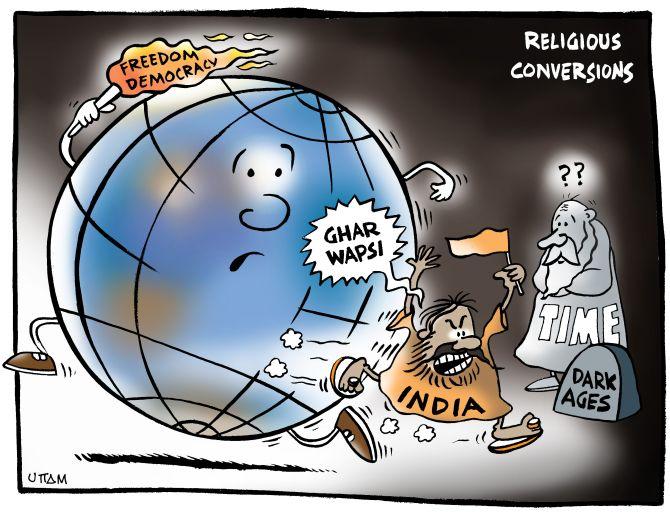'Since the general election is only two years away, the BJP will need a surefire plan of action -- and it cannot be either the Ram temple or ultra-nationalism,' says Amulya Ganguli.
Illustration: Uttam Ghosh

There is no time better than the present to instill a sense of nationalism in the country, Attorney General Mukul Rohatgi said in the Supreme Court.
The learned counsel for the government did not explain why it has suddenly become so important in the 70th year of Independence to arouse the feeling of patriotism.
Nor did he point out how its supposed absence all these years has harmed the country.
However, does this argument have anything to do with the belief that if nationalism is not immediately propagated with greater vigour, the slide in the BJP's fortunes will continue as it did during the last two years when it lost six elections in a row in Delhi, Bihar, West Bengal, Kerala, Tamil Nadu and Puduchery?
Or is the lawyer barking up the wrong tree?
The attorney general's pleas came in the context of a plea to the Supreme Court to frame a policy on the national anthem, the national flag and the national song, which, in a petitioner's view, is Vande Mataram, Bankim Chandra Chattopadhyay's invocation to Mother India in a passage in his 19th century novel, Anandmath, which celebrated the end of Muslim rule in India and hailed the advent of the British.
The Supreme Court turned down the appeal for putting the 'national song' on a par with the national anthem on the grounds that there was no such concept in the Constitution.
It also ruled that there was no need to stand up if the anthem was part of the storyline of a film or a newsreel or a documentary.
The recent judicial diktat on the playing of the anthem in cinema halls followed a petitioner's plea for such an order since he felt aggrieved when he stood up during such a scene in Kabhi Khushi Kabhi Gham and was berated by those in the audience sitting behind him.
However, the fact that the patriots haven't lost heart by these minor setbacks could be seen in Rohatgi's insistence on making the singing of the anthem mandatory in schools.
In doing so, he wanted the Supreme Court to overturn an earlier verdict which decreed that such singing was not required and that all that the students needed to do was to stand respectfully while the anthem was being played.
Having pushed for the national song, however, it is not impossible that the saffron hardliners will now argue in favour of a national slogan such as Bharat Mata ki Jai.
Only a few months ago the plea for chanting this slogan was very much in the air with Maharashtra Chief Minister Devendra Fadnavis demanding that those who refused to do so must leave the country and Baba Ramdev expressing regret that the law did not allow him to behead the nay-sayers.
And as may be expected, that doughty defender of loyalty to the motherland, Anupam Kher, identified the slogan as the 'only definition of nationalism for Bharatwassis.'
Yet, strangely, one does not hear these champions of the chant any more.
Why the silence?
Or is the BJP fine-tuning its line?
It is noteworthy that the issue of nationalism hasn't been raised by the BJP with any great enthusiasm during the assembly election campaigns, whatever its lawyers may say in the Supreme Court.
The party hasn't even referred to the surgical strikes on Pakistani terror camps as it once said that it will do.
There has been silence, too, about the Ram temple while firebrands like Yogi Adityanath have taken a back seat.
Considering that RSS chief Mohan Bhagwat has said that 'no one has the right to judge anybody else's patriotism,' the BJP and sections of the Sangh Parivar may have come to the conclusion that they may have overplayed their hand, especially during the agitations in the Jawaharlal Nehru University and the Hyderabad Central University when students not aligned with the Akhil Bharatiya Vidyarthi Parishad were branded as anti-nationals.
It is possible that the top honchos in the party and the Parivar have sensed that the kind of muscular nationalism which they favoured hasn't yielded the expected electoral dividends.
This assessment has probably been confirmed by the realisation that the March 11 results may not be an occasion for firecrackers to be let off with gusto in front of the BJP offices.
Since the general election is only two years away, the BJP will need a surefire plan of action -- and it cannot be either the Ram temple or ultra-nationalism.
The party won in 2014 not only on the basis of Narendra Modi's promise of development, but also the belief among the hoi polloi that he had dumped the pro-Hindu agenda.
The second point was not quite absorbed by the ghar wapsi and love jihad brigades.
But, now, as Bhagwat's comments show, the BJP is coming to terms with the much-derided (by the Hindu fundamentalists) 'idea of India' with its emphasis on pluralism and tolerance.
Amulya Ganguli is a writer on current affairs.
Do read the columns and features on nationalism in the RELATED LINKS below.










